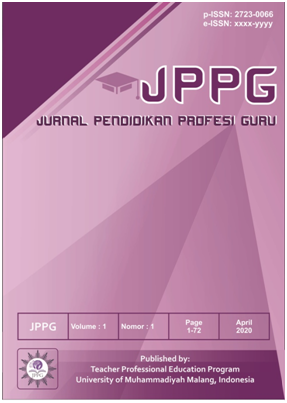Initiating formulaic design to increase teachers professional development (TPD) for 21st Century teaching
DOI:
https://doi.org/10.22219/jppg.v1i1.12254Abstract
Encounter the changing needs of students in the 21st century of teaching and learning, English as a Foreign Language (EFL) teachers have to pursue professional development. EFL Teachers have to do this by assessing and reexamining their teaching preparation and practices. This study aimed to initiate a formulaic design to increase TPD for 21st-century teaching. The data were obtained through the open-form questionnaire with 20 English teachers, as well as through the unstructured interview. It was found that teachers still face difficulties dealing with 21st-century skills and Information and Communication Technology (ICT) Integration. Dual-mode of TPD could give a contribution as part of the training that is conducted in conventional ways, and the rest is delivered through the e-learning programs. A dual-mode TPD program as an initial model of TPD can be conducted both in conventional ways and through e-learning programs because it is the benefit to educate larger numbers of EFL teachers and more economically.Downloads
References
Kavadella, A., K. Tsiklakis, G. Vougiouklakis, and A. L. (2012). Evaluation of Blended Learning Course for Teaching Oral Radiology to Undergraduate Dental Students. European Journal of Dental Education.
Ballis, A., and D. F. (2009). E-Learning in der Hochschule: Diskurse, Didaktik, Dimensionen (E-learning at the university: discourse, didactics, dimension).
Bautista, A. & Ruiz., & O. (2015). Teacher professional development: international perspectives and approaches. Sychology, Society, & Education, 7, 13.
Firman, H. (2010). Dampak program kerjasama FPMIPA UPI dan JICA [The impact of collaboration between FPMIPA UPI and JICA.
Fresko, B., & Nasser-Abu Alhija, F. (2014). Induction seminars as professional learning communities for beginning teachers. Asia-Pacific Journal of Teacher Education. https://doi.org/10.1080/1359866x.2014.928267
Higgins, S., and D. M. (2001). Teachers’ Thinking about Information and Communication Technology and Learning: Beliefs and Outcomes. Teacher Development.
Kashefi, H., Z. Ismail, Y. M. Yusof, and R. A. R. (2012). Supporting Students’ Mathematical Thinking in the Learning of Two-Variable Functions through Blended Learning. Social and Behavioral Sciences.
Matzat, U. (2013). Do Blended Virtual Learning Communities Enhance Teachers’ Professional Development more than Purely Virtual Ones? A Large Scale Comparison. Computers & Education, 60(1).
Noh, T., J. Cha, S. Kang, and L. C. S. (2004). Perceived Professional Needs of Korean Science Teachers Majoring in Chemical Education and their Preferences for Online and On-Site Training. International Journal of Science Education.
Nugraha, E. (2009). Pengaruh e-learning terhadap kemampuan berpikir kreatif siswa SMP pada konsep pencemaran lingkungan [The impact of e-learning on students’ creative thinking skills].
Olympiou, G., and Z. C. Z. (2012). Blending Physical and Virtual Manipulatives: An Effort to Improve Students’ Conceptual Understanding through Science Laboratory Experimentation. Science Education.
Owston, R., Wideman, H., Murphy, J., & Lupshenyuk, D. (2008). Internet and Higher Education Blended teacher professional development : A synthesis of three program evaluations. The Internet and Higher Education, 11(3–4), 201–210. https://doi.org/10.1016/j.iheduc.2008.07.003
Roekel, D. (2008). English Language Learners Face Unique Challenges. NEA Education Policy and Practice Department.
Sorensen, P., J. Twidle, A. Childs, and J. G. (2007). The Use of Internet in Science Teaching: A Longitudinal Study of Developments in Use by Student-Teachers in England. International Journal of Science Education.
Widodo, A., P. Irfan, M. Ihsanudin, and C. W. (2010). Facilitating Teachers’ Professional Development through Lesson Study: Insight from Two Years Lesson Study at SMP Tunas Agro.
Widodo, A., Riandi, Amprasto, and A. R. W. (2006). Analyses of the Impact of Teachers’ Professional Development Programs on the Improvement of Teachers’ Teaching Practice. A Research Report on Educational Policy. Indonesia University of Education.
Wu, J. H., R. D. Tennyson, and T. L. H. (2010). A Study of Student Satisfaction in a Blended E-learning System Environment. Computers & Education, 55, 155–164.
Young IP and Castetter WB. (2004). The Human Resource Function in Educational Administration.
Yumuk, A. (2002). Letting Go of Control to the Learners: The Role of Internet in Promoting a More Autonomous View of Learning in an Academic Translation Course. Educational Research.






